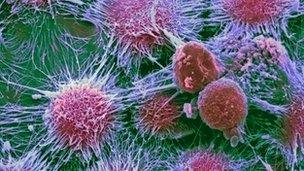DNA analysis shows huge genetic diversity in tumours
- Published
- comments

Taking a sample from one part of a tumour may not reveal its full genetic identity, according to research by scientists from Cancer Research UK (CRUK).
They carried out the first genome-wide analysis of the genetic variation between different regions of the same tumour using samples of kidney cancer.
They found around two third of genetic faults were not repeated across other biopsies from the same tumour. The research was published in the New England Journal of Medicine.
Lead author Professor Charles Swanton, based at CRUK's London Research Institute and the UCL Cancer Institute said:
"This has revealed an extraordinary amount of diversity, with more differences between biopsies from the same tumour at the genetic level than there are similarities. The next step will be to understand what's driving this diversity in different cancers and identify key driver mutations that are common throughout all parts of a tumour."
The tumour samples were donated by patients with advanced kidney cancer being treated at London's Royal Marsden Hospital.
The findings may explain why personalised cancer treatments based on biomarkers from tumour biopsies are not always successful.
The gene sequencing revealed that even samples next to each other in the tumour were not identical.
Professor Swanton said as a clinician the findings did not surprise him but they helped explain why cancers are so difficult to treat once they have spread.
He said cancers adapted as they grew, along 'Darwinian principles' of evolution: "We need to think of tumours like trees, with common mutations in the trunk but the more they spread into the branches the greater the genetic diversity."
Prof Swanton said the findings underlined the importance of early diagnosis of cancer before it had spread, and the need to target the common mutations in the 'trunk' of the cancer.
- Published8 April 2009